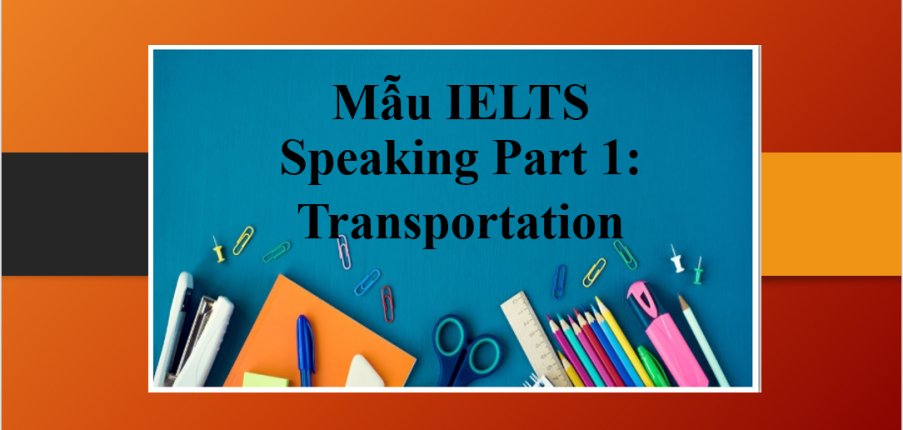Topic Transportation | Đề bài, câu trả lời mẫu IELTS Speaking Part 1
Một số câu hỏi chủ đề IELTS Speaking Part 1 Transportation
- What form of transport do you prefer to use? Why?
- How often do you take buses?
- Can you compare the advantages of planes and trains?
- How much time do you spend traveling on a normal day?
- Would you ride bikes to work in the future?
- What will become the most popular means of transport in your country?
- Do you prefer public transport or private transport?
- Did you take public transportation when you were a kid?
- Will there be more people taking public transportation in the future?
- Do most people prefer public transportation in your country?
Câu trả lời mẫu chủ đề IELTS Speaking Part 1 Transportation
What kinds of transport do you take to go to work/school?
Well, I’m an environmentally-conscious person so I use buses on a daily basis to go to school. I do believe that by using bus services, I can contribute to reducing traffic congestion and CO2 discharged from private vehicles.
What will become the most popular means of transportation in your country?
In my opinion, cars will become the most popular form of transport in Vietnam because of their convenience. People don’t need to pay attention to the weather if they use cars which protect people from the sunlight and rain.
Do you prefer public transportation or private transportation?
As I mentioned, I really pay attention to the environment so I always use buses or trains on every single journey as I can play a part in protecting the environment. Additionally, now, I’m living on a tight budget and public transport is also cheaper so I can save a lot of money.
What are the differences about transportation in your country between the past and now?
Transportation in my country has changed significantly over the past few years. In the past, because of 2 wars, people almost used bicycles and motorbikes for transportation. However, cars are very popular in Vietnam nowadays thanks to economic development. In the future, I think most people will use cars every day.
What type of public transport can be found in your city?
Well, in my city, buses, and taxi motorbikes are the most popular means of public transport. You know, high-way trains are being constructed in some routes in my city. It would be the first time that this kind of transport appears in Vietnam.
What type of public transportation do you use most?
Actually, I remember that when i was in high school, i went to school by bus daily. How to say, It’s cheap and it’s also considered to be the most environment-friendly vehicle which helps avoid traffic jam..
Are there any transport problems in your city?
Of course, yes, traffic congestion is the biggest problem in Hanoi, especially in rush hours, there are usual long lines of vehicles on the street. I believe, it’s a total waste of time and money. •
How would we improve that problem?
Truth be told, it’s a tough question. But i suppose, we should use public vehicles instead of our private cars if we could. Because researches show that 70% of jamis caused by too many cars on the street. In addition, the government should allocate more budgets updating the road system.
Từ vựng về Transport
an environmentally-conscious person: người có ý thức bảo vệ môi trường
on a daily basis: hàng ngày
contribute to + V-ing: góp phần vào
every single journey: mọi chuyến đi
play a part in: là một phần trong
living on a tight budget: sống tiết kiệm
Means of transport (n): Phương tiện giao thông
Traffic congestion (n): Tắc đường
Wend its way forward (v): Đi chậm chậm về phía trước
MRT journey (Mass Rapid Transport journey) (n)
Chuyến đi bằng MRT (Tàu điện ngầm ở một số nước như Singapore, Đài Loan)
Embark on the journey (v): Thực hiện chuyến đi
Car rent (n): Phí thuê xe ô tô
Boarded (v): Lên (tàu/xe)
Filled up (v): Lấp đầy
Jam-packed (adj): Đông người
Rush hours (n): Giờ cao điểm
ambulance (n): xe cứu thương
arrival platform (n): sân ga đến
bus station (n): bến xe bus
bus stop: điểm xe buýt
coach/ long-distance bus: xe buýt chạy đường dài/xe khách
commuter: người đi làm trong thành phố mỗi ngày nhưng phải đi một quãng đường dài
departure platform: sân ga đi
destination: địa điểm tới
double-decker: tàu thủy hai boong
energy sources: nguồn năng lượng
escalator: thang máy
express train: tàu nhanh
ferry: bến phàhand
luggage: hành lý xách tay
infrastructure: cơ sở hạ tầng
intersection; crossroads: nơi đường giao nhau
Xem thêm các tài liệu Tiếng Anh hay, chi tiết khác:
TOP Việc làm "HOT" dành cho sinh viên:



